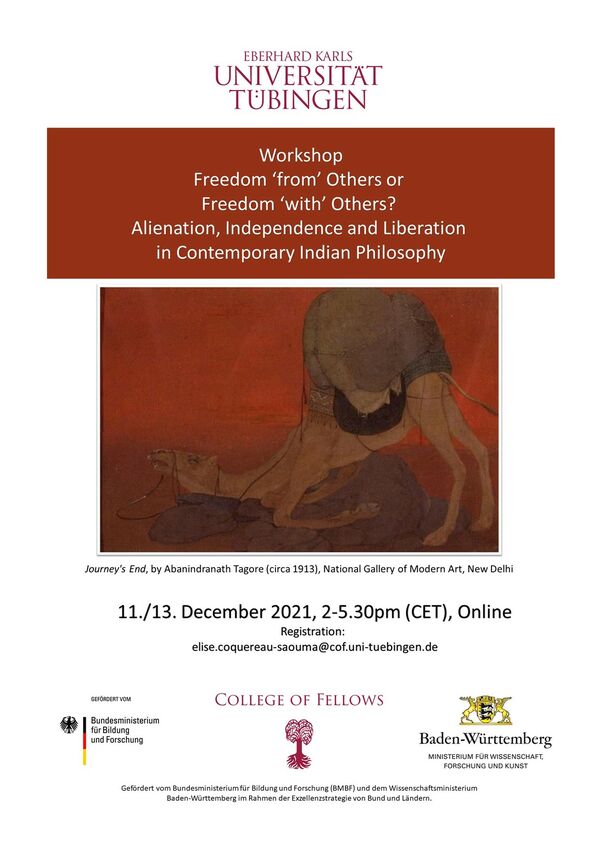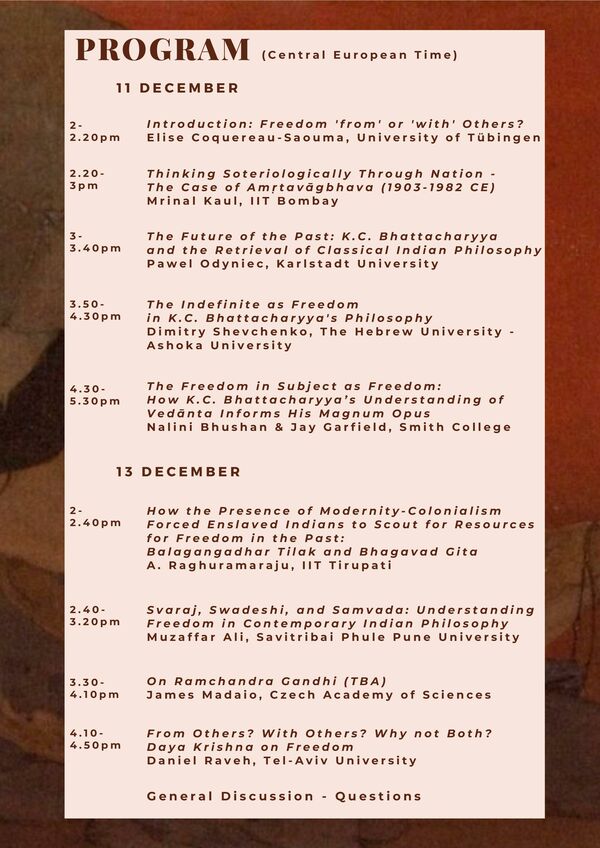

Workshop on Contemporary Indian Philosophy
Workshop on Contemporary Indian Philosophy (Online, University of Tübingen, 11/13 December 2021, provisionally from 8-11/11.30am (EST); 2-5/5.30pm (CET); 3-6/6.30pm (Israel ST); 6.30-9.30/10pm (India ST))
Title: Freedom from Others or Freedom with Others? Alienation, Independence and Liberation in Contemporary Indian Philosophy
‘Freedom’ in modern and contemporary Indian philosophy in English can have two different meanings. One is metaphysical and universal. It describes a state of being to be reached, often called ‘(transcendental) liberation’ or ‘mokṣa’. The other is political and inter-personal or social. It implies a freedom of action, an inter-personal process that often requires negotiation within society, or political struggles. During the freedom movement in India, it was discussed as ‘svarāj’ (self-rule, independence), famously known from Mahatma Gandhi. Yet the borders between a metaphysical, or spiritual/religious sense of freedom, and a political or social one, are difficult to trace in contemporary Indian philosophy.
Mahatma Gandhi’s or Aurobindo’s political struggles are at the same time spiritual, with particular reinterpretations of Advaita. In academic philosophy, the ‘svarāj in Ideas’ of Krishna Chandra Bhattacharyya, addressed to his students, pled for extending the political struggle to an intellectual one against “cultural subjection”. Independence is correlated to freedom in thinking. In his Studies in Philosophy, ‘freedom’ is described as one Absolute, detailed in a gradual detachment from all objectivities, toward the absolute subjectivity. Even though in the twentieth century freedom is located within the boundary of knowledge, and even though there are not specific ritualistic Hindu references, ‘freedom’ also has a universal, transcendental, spiritual connotation, as the highest state to be reached in an inner realization of the Absolute.
In a way, Krishna Chandra Bhattacharyya expresses a persisting plurality and subtle intermingling of the quest for ‘freedom’ in contemporary Indian philosophy: Is freedom a political svarāj, in which case it ought to be reached with others in the socio-political realm, or is freedom the way to reach inwardly an absolute state of liberation from the world of alienation that others cause? Even if it is socio-politically, is independence also not a struggle against alienation, namely a quest for independence from Others (colonial rulers), and in which case is this independence also a liberation from a world? Is realizing one’s own inward liberation a way to recognize the unity of all, or an exclusion of all those we leave behind?
In modern and contemporary India, responses vary: they question the socio-political formation of the idea of freedom in relation with colonization, the inclusivity of Brahmanical metaphysics and the secularization of mokṣa, and in relation with existentialism, the relation to alienation and inter-subjectivity, namely the role of Others in the realization of freedom. Highlighting the diversity and continuity of the concepts of freedom in Indian philosophies, and the newness that the political context and the contacts with non-Indian philosophies brought to the concept, this workshop questions the relation between freedom(s) and Others, svarāj and mokṣa, and the intricacies between metaphysics and politics.
With:
-Muzaffar Ali, University of Pune (India)
-Nalini Bhushan, Smith College (USA)
-Jay Garfield, Smith College (USA)
-Mrinal Kaul, Indian Institute of Technology, Mumbai (India) (to be confirmed)
-James Madaio, Czech Academy of Sciences (Czech Republic) (to be confirmed)
-Pawel Odyniec, Karlstad University (Sweden)
-A. Raghuramaraju, Indian Institute of Technology, Tirupati (India)
-Daniel Raveh, Tel-Aviv University (Israel)
-Dmitry Shevchenko, Ashoka University (India), The Hebrew University (Israel)
Organization: Elise Coquereau-Saouma (University of Tübingen)
Program
11.12.2021 | Central European Time: 14:00 - 17:30 India Standard Time: 18:30 - 22:00 Israel Standard Time: 15:00 - 18:30 Eastern Standard Time: 08:00 - 11:30 |
14:00 - 14:20 | Elise Coquereau-Saouma, Universität Tübingen (Germany): Introduction: Freedom 'from' or freedom 'with' Others? |
14:20 - 15:00 | Mrinal Kaul, Indian Institute of Technology, Mumbai (India): Thinking Soteriologically Through Nation - The Case of Amṛtavāgbhava (1903-1982 CE) |
15:00 - 15:40 | Pawel Odyniec, Karlstad University (Sweden): |
15:50 - 16:30 | Dmitry Shevchenko, Ashoka University (India), The Hebrew University (Israel): |
16:30 - 17:30 | Nalini Bhushan & Jay Garfield, Smith College (USA): |
13.12.2021 | Central European Time: 14:00 - 17:30 India Standard Time: 18:30 - 22:00 Israel Standard Time: 15:00 - 18:30 Eastern Standard Time: 08:00 - 11:30 |
14:00 - 14:40 | A. Raghuramaraju, Indian Institute of Technology, Tirupati (India): How the present of modernity-colonialism forced enslaved Indians to scout for resources for freedom in the Past: Balagangadhar Tilak and Bhagavad Gita |
14:40 - 15:20 | Muzaffar Ali, Savitribai Phule Pune University (India): Svaraj, Swadeshi, and Samvada: Understanding Freedom in Contemporary Indian Philosophy |
15:30 - 16:10 | James Madaio, Czech Academy of Sciences (Czech Republic): On Ramchandra Gandhi |
16:10 - 16:50 | Daniel Raveh, Tel-Aviv University (Israel) From Others? With Others? Why not Both? Daya Krishna on Freedom |
| 16:50 | General Discussion & Questions |